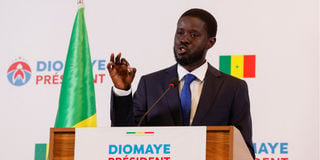Lessons from the Senegal poll for young Africans

Senegal's president-elect Bassirou Diomaye Faye speaks during a press conference in Dakar, Senegal March 25, 2024.
Senegal recently swore in its youngest democratically elected leader as President. The hitherto little-known Basirou Diomaye Faye, 44, received overwhelming support from his fellow young Senegalese in a presidential election that he won 54 per cent of the vote in the first round.
Faye’s rise to the presidency, backed by firebrand opposition leader Ousmane Sonko, who had been barred from vying in the elections, stands as a beacon of hope and inspiration. Truly, the Senegal poll offers hope to the young Africans frustrated by lack of economic opportunities with the adult generation not taking their needs and concerns seriously.
It also is a powerful reminder that the future of Africa is in the hands of young people. Far from the dominant narrative, youth are not hopeless and helpless—they have the power to determine their destiny. They are powerful beyond measure.
Young leaders need to devise strategies for mobilising the youth, many of whom tend to be derailed by handouts at the expense of visionary leadership. They must not only complain of lacking in resources. They are educated and tech-savvy; they should use the relatively meagre resources at their disposal.
Social media is a tool they can use. For example, Sonko, a 49-year-old tax inspector-cum-whistleblower, was popular, especially because he managed to electrify young people with slick social media campaign, which he used to rip into Senegalese elites and whip up national sentiments.
The youth must engage in democratic processes. They are a particularly important voting bloc because of their large numbers. Their increasing reluctance to take part in politics and exercise their right to vote is, itself, a huge threat to democracy.
In many African countries, the turnout among young people in elections is significantly low compared to their huge population. In this case, they cannot claim that older voters betray them. The youth have a vote and a voice. They have an obligation to register as voters so that they can participate in the polls. The present and future belongs to the youth and they should step up to take an active role.
Youth should elect leaders with their interest at heart. They should not be apathetic; their plight is directly related to the kind of leaders they elect. They have the power to put in office leaders who care about their interests. A government put in place by an overwhelming support of voters enjoys a significantly huge legitimacy to govern.
A youthful population that is largely marginalised, excluded from decision-making and deprived of basic needs and rights justifies a new perspective on politics. Africa’s youth have always remained a ticking time bomb, which, unfortunately, many regimes have failed to acknowledge through focused actions.
A focused leadership should re-engineer politics and economy to anchor the youth agenda in governance. But the youth also take a share of blame for their failure to mobilise themselves in a manner that insulates them from the bad tribal politics. This has left them vulnerable to unscrupulous politicians, who lure them with generous manifestos that are constantly reviewed when elections beckon but with little constructive action thereafter.
Mr Obonyo is a public policy analyst. [email protected].





